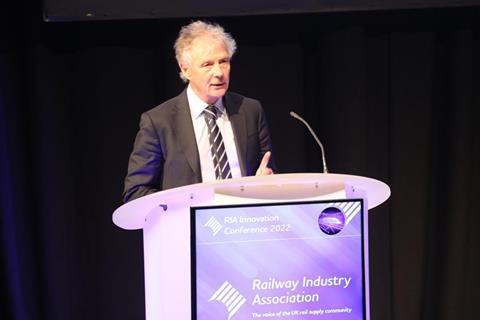
UK: There will be ‘vast opportunities’ for the private sector to shape the rail sector as the development of Great British Railways gathers pace, Keith Williams, author of the Williams-Shapps Review into rail reform, told the Railway Industry Association’s Innovation Conference.
GBR is being established ‘as a single guiding mind’ to oversee train operations and Network Rail, and will also take on functions related to innovation currently overseen by RSSB. Williams told the RIA conference in Nottingham on April 26 that he expects primary legislation to create GBR to be placed before parliament ‘in 2024’, but that the current GBR Transition Team led by Andrew Haines is already able to make significant progress in shaping the future structure.
‘Since I started my review in 2018, I have dealt with two transport secretaries and two rail ministers, and they have all believed that the private sector is key to delivering the innovation the industry needs to improve the customer experience’, Williams said.
The key, he felt, would be for GBR to harness ‘the best’ from the existing supply chain and new entrants from other industries to ensure that passengers and freight customers see ‘a punctual and efficient railway’.
Train operators meanwhile have been ‘freed from the complexity of forecasting’ as franchises have been replaced by National Rail Contracts.
Williams reiterated that the pandemic has exacerbated trends that were apparent prior to the crisis, such as more flexible working patterns. But he acknowledged that Covid-19 had prompted ‘quite a lot of questions from the Treasury about rail funding and costs’. Therefore it was no surprise that efficiency savings and value for money for taxpayers would be major considerations under the transition to GBR.
Making innovation easier could help mitigate some of the challenges, he explained, and GBR was already working on several initiatives to deliver this objective.
Under GBR, data ‘would be open by default’, with the planned Rail Data Marketplace to launch later this year. He also indicated that while GBR would establish a digital national rail ticketing channel, this would be developed ‘in partnership with’ private sector specialists in the field.
However, he cautioned that one of GBR’s aims would be to streamline the innovation process to ensure technology, products and services are not duplicated unnecessarily. ‘The public very clearly told us that they want rail to function as one interoperable network right across the country’, Williams emphasised.
He predicted that GBR’s planned regional divisions would work ‘locally with research institutes, SMEs and universities’ to ensure R&D activity is sufficiently geographically spread. ‘Ultimately GBR is about giving long-term certainty about the industry strategy with the aim of making innovation easier’, he concluded.



